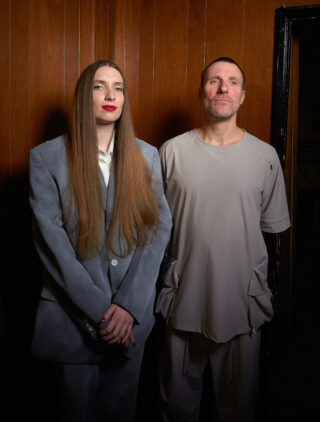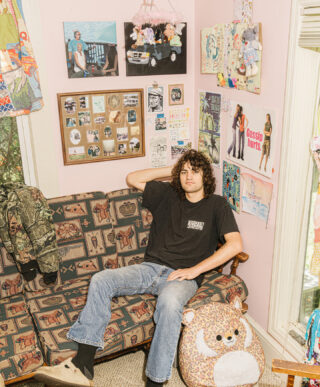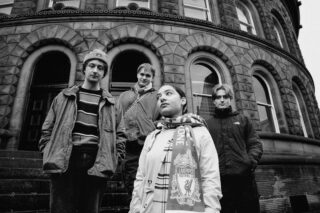
“So, who is Jackie Lynn?” I ask Haley Fohr, and she smiles, smooths her long, purple hair over her shoulders and launches into a well-rehearsed narrative, reciting the autobiography of her alter ego in serious, measured tones that suggest we’re talking about someone real – which, it turns out, we almost are. “Jackie Lynn is a woman two years younger than me,” she begins. “She was born and raised in Franklin, Tennessee. Five years ago she moved to Chicago, to the South Side. She took a Greyhound bus and on the way there she met a guy named Tom. They quickly fell in love and she kind of got wrapped up in this drug trade he’s involved in. They had a good time for a few years, and then he left. Vanished overnight, after a big fight. Left her in a lot of debt, fending for herself. She took the reins in his business, got herself out of debt.”
She pauses for effect.
Jackie is currently ‘at large’ and on the road looking for Tom.”
That’s one answer, but it doesn’t tell the whole story. Because Jackie is also Fohr, or Fohr is Jackie. It’s true that at first glance they have little in common. Fohr is whimsical; a smart, bookish musician with an existential streak – up until now she’s worked as Circuit de Yeux, producing ethereal, avant-garde folk music – while Jackie is straight-talking; a no-bullshit country singer who has played the drugs trade and won. But alter egos always offer an unexpected flash beneath the flesh of their creators. Jackie is the embodiment of Fohr’s rebel femininity, her sexy, dangerous side, created as a fuck you to all the men who’ve ever tried telling her how to live her life. Jackie is unashamedly a woman. “She’s a sister. She’s definitely female and I’m excited to present something that is so obviously female.”
“I recorded ‘Jackie Lynn’ [an album released this month via Thrill Jockey] about a year ago and it’s been really interesting, the coalescing of our lives,” Fohr explains. “Jackie’s powerful and she’s sexy. She’s got it together. For me it was like a superhero or something that I could be, maybe. Traits of a woman that I probably never felt comfortable in. But suddenly this record’s coming out and I do. I don’t know if it’s just the age and the time in my life or if it’s because of the Jackie Lynn or what.”
Fohr came up with the Jackie Lynn concept on a foggy morning in LA. The idea evolved quickly, and she was excited. But then, as she told friends her Jackie plans, Fohr was shut down by a man with an opinion. (She won’t name him but tells me he is “an older gentleman, late 30s. Kind of a big deal. A film guy.’) He didn’t like the idea? “He said: ‘that’s the worst idea I’ve ever heard; you should let it lie. Do not follow this through, you will regret it.’ And to me that meant that I had to do it.” She turns on a little of the Jackie attitude. “I’m just so sick of dudes telling me what to do.”
It’s something she’s noticed more as she’s grown a little older; the way men just don’t hold back from offering their point of view. “On a broad spectrum I think men are gendered to tell women what to do. They are gendered to have the answers and they feel confident to say don’t do that, do this. And women are gendered to respond in a way that is appealing and pleasing and agreeable. So in a way it was the perfect way for Jackie to be born, as a response, and it’s not an agreeable response. It’s her response.”
Jackie’s disagreeable edge is not just a generic feminist statement; it’s also Fohr’s not-so-subtle way of enacting revenge on specific guys. She explains how some of the songs work as an outlet for those fantasies of violence and retribution that we all carry in our darkest hearts. “One track in particular, called ‘Smile’, is Jackie at her limit, walking down the street, and another man coming up to her and being like, ‘why don’t you smile, baby?’ You know when I was in high school I had this teacher that was like, ‘smile Haley, smile Fohr,’ and I had a secret fantasy where I strangled him to death and told him to shut the fuck up – where some really violent, hilarious comical situation would go down. So that’s… that.”
Although I am totally on board with the feminist retribution – which of us hasn’t harboured shoot ’em up fantasies after being told what to do by some dude or another (and you have to admit, Fohr’s line ‘I’m so sick of these jocks/with their little tiny cocks’ is one you wish you’d written) – I am less sold on Jackie’s relationship with Tom. What does it mean that Jackie, this strong, fierce woman channelling her cunning and her sexuality on her own terms, leaves a lucrative drug racket to chase some deadbeat across America? Fohr considers my question and shrugs. For her, it’s not an issue. “I mean, Tom was just a conduit. Jackie was on her way already to Chicago, she didn’t move there for Tom. I just think that’s how life goes. You dive deep and you get hurt or you have a great reward. You never know.”
Fohr has worked hard to strike an even balance in the presentation of Jackie Lynn. There is a fine line between intriguing and cheesy and she is well aware of the drawbacks that come with the adoption of an alter ego, which include unlikely and unflattering comparisons. “Until this project, I’d never honestly heard of Chris Gaines,” she laughs, “but I’ve been getting that a lot with this. You know Chris Gaines?” (I don’t) “Garth Brooks becomes a rock singer – he did it a little different to me in that he did embody Chris Gaines and tried to play it off as, like, ‘who’s Garth Brooks?’ To me it was super-lame and definitely not a path that I wanted to take with Jackie.”
Jackie hasn’t performed yet; she has no interest in promoting her own record. “I have a lot of people interested in interviewing Jackie. But she’s not available, obviously.” There are physical relics available though. The album she left behind, on vinyl (the record won’t be released in any other format), in a gold and red LP sleeve, dusted with cocaine. “It’s important to me that it’s vinyl only. It’s not on CD because Jackie listens to vinyl. She doesn’t listen to CDs — they’re pieces of junk.”
You can hear in the music that it was freeing for Fohr to break away from her experimental roots and try a more mainstream sound. She agrees, although she’s adamant that ‘Jackie Lynn’ wasn’t made to appeal to a wider audience (“I would say the audience comes into play zero percent. I don’t think about that side of it at all.”), it was a means through which to stretch herself musically. “For me, technically it was really eye opening,” she says. “Jackie is a really chilled, cool woman vocally, and my style is really this operatic unique warble, so even just delivery and like using more words and consonants and telling a story, rather than these abstruse, nebulous grand ideas, was really fun for me and challenging. It was fun coming out of my own personality. The weight got really heavy – doing these existential quests all the time – and having something so concrete and physical and intact laid the foundations to have a really great time with this project.”
Still, I wonder how her fans, friends and family have reacted to this about-turn. ‘Jackie Lynn’ – a dark, mysterious alt. country record that’s also easily enjoyable – is so different from Fohr’s other music that she might easily have alienated her existing audience. “They love it,” she smiles. “They prefer it for whatever reason. My grandmother has all my CDs and I sent her the promo for this one, and the comments I get are ‘I love being able to understand what you’re saying.’ You know, the songs are shorter: easier to digest for people who aren’t going to experimental free jazz shows all the time.”
I ask if the world will ever get to meet Jackie?
“We did have one get-together in which Jackie invited her friends over and that was really interesting. There’s some interviews done, so perhaps they will come out into the world. And I did a DJ gig where I wasn’t Jackie but I was definitely stepping towards her.” Fohr breaks off, excitedly. “I’m into that shit man. I’m so into dressing up and taking on these alter egos just for a night. It’s a secret adventure. It’s not like I’m going into a bar and going ‘yo, what’s up! I’m this person tonight’, but in my mind it’s this game where I’m pushing the envelope of who am I, and who am I tonight, and what I’m wearing, and how am I presenting myself and how I carry my body.” She smooths her hair back again and tells me, with an animated intensity: “Living life as art is something I’m extremely interested in at this time.”






